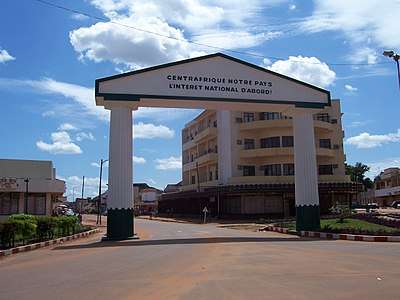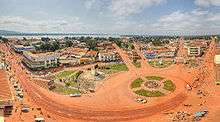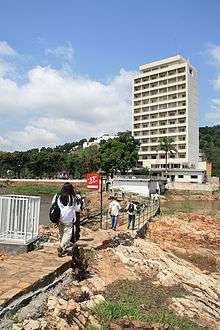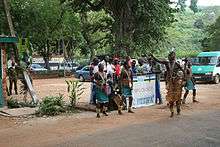Bangui
Bangui (pronounced: bang-EE) is the capital of the Central African Republic. Bangui lies on the northern banks of the Ubangi River just below a series of rapids that limit major commercial shipping farther upriver, on the southern border. The navigable Ubangi River turns sharply south below Bangui and connects to the Congo River just south of the Equator near Brazzaville as its chief northern tributary. The river marks the border between the Central African Republic and the Democratic Republic of the Congo (DRC). The Congolese town of Zongo sits opposite the river from Bangui.
| WARNING: Most western countries advise against all travel to CAR and Bangui due to on-going inter-ethnic violence, particularly in Bangui. Reports of violence, reprisal killings, looting and human rights abuses continue across the country. UK health authorities have classified the Central African Republic as having a risk of Zika virus transmission. See the Central African Republic page for more details. | |
Government travel advisories
| |
| (Information last updated Apr 2019) |
Understand
Climate
- See also: Hot weather
| Bangui | ||||||||||||||||||||||||||||||||||||||||||||||||||||||||||||
|---|---|---|---|---|---|---|---|---|---|---|---|---|---|---|---|---|---|---|---|---|---|---|---|---|---|---|---|---|---|---|---|---|---|---|---|---|---|---|---|---|---|---|---|---|---|---|---|---|---|---|---|---|---|---|---|---|---|---|---|---|
| Climate chart (explanation) | ||||||||||||||||||||||||||||||||||||||||||||||||||||||||||||
| ||||||||||||||||||||||||||||||||||||||||||||||||||||||||||||
| ||||||||||||||||||||||||||||||||||||||||||||||||||||||||||||
The Central African Republic is just north of the Equator and consequently throughout the year daily high temperatures rarely fall below 30 °C (86 °F). The rainy season lasts from May until October. Bangui, being in the south of the country and thus closest to the Equator, is slightly hotter and wetter than the northern parts of the country.

Get in
By plane
- 🌍 Bangui M'Poko International Airport (BGF IATA) (7 km (4 mi) northwest of Bangui). With a capacity of 10,000 passengers, the airport was serving 120,000 in 2012. In 2017, the airport was functioning under the supervision of the UN aviation officials. There are flights to Douala (DLA), Kampala (EBB), Nairobi (NBO), Paris–Charles de Gaulle (CDG, once a week), Casablanca (CMN), Abidjan (ABJ), Cotonou (COO) and N'Djamena (NDJ).
Visas are required for all European (and probably most other) travellers, and should be obtained before arrival.
The arrival procedure is a bit long, requiring at least two queues to get all necessary visa stamps. Exit from the arrival hall is through "Things To Declare", with customs officers picking out passengers randomly for baggage check. Security guards check the luggage tags on the way out.
Be careful of pickpockets outside the terminal building, including people claiming to provide assistance.
See



The city centre lies near the river and features a large triumphal arch dedicated to Bokassa, the Presidential Palace and the central market. Lying 5 kilometres (3 mi) further north, the heart of the residential area has the largest market and most nightlife. North of the city lie rolling hills.
Buy
Buy beautiful wood carvings, but do not be tempted to buy rare African Grey parrots that are being traded illegally in the town. You will be arrested if you do.
Eat
The city has a community of French expats, which translates into one of the best ice cream parlours in Africa; a supermarket that sells international (mainly French) delicacies, e.g. foie gras; and a really good Italian restaurant.
Drink
- Mocaf. One of the local beers. Tend to be the cheapest and very good in quality. Comes in a 65 cl (23 imp fl oz; 22 US fl oz) big bottle, perfect for beer lovers.
Sleep
- 🌍 JM Residences 3, Avenue Nasser, ☎ +236 70 16 09 25. It's been called the best accommodation in town. Clean and air conditioned rooms, hot water was available at all times. Wi-Fi Internet available with OK speeds. Electricity was more or less constant. There's a restaurant with fair prices, ~CFA 6,000 for a meal and a drink, 5,000 for a full breakfast. CFA 65,000/night.
- JM Residences 2, Avenue Barthélemy Boganda, ☎ +236 70 16 09 24. Basic accommodation with clean and air conditioned rooms. The environment is quiet rural, not so much to do outside the rooms. A basic restaurant is serving food all day. Electricity goes out sometimes. CFA 65,000/night.
- 🌍 Oubangui Hotel, Boulevard du Général de Gaulle, ☎ +236 77 77 30 38. The closest you can get to "luxury" in Bangui. A high-rise just next to river Ubangi offering some spectacular views. As expected, due to the ongoing conflict, there are several shortcomings in service and standards. From US$80 per night.
Connect
Four GSM-900 mobile telecommunications companies, Telecel CAR, Nationlink Telecom RCA, Orange CAR and MOOV CAR operate out of Bangui. State-owned Socatel is the principal telecom in CAR and Bangui, and is responsible for the operation and maintenance of the communications infrastructure.
Internet cafes in town allow users to access the Internet, also using own laptop computers. Download speeds are acceptable and prices reasonable. MOOV provides GPRS/EDGE Internet access with USB sticks for reasonable prices in whole Bangui and in major cities of CAR as well.
Le Grande Cafe in the city center has open free Wi-Fi and serves coffee and food.
MOOV and Orange phones can access GPRS/EDGE networks if properly configured. Configuration is provided free at the telecommunication offices at PKZero. Speeds are generally EDGE, but may fade to G. GPRS is available in Bangui center, but fades out by PK12.
Stay safe
As of April 2019, the UK Foreign Office and other western governments advise against all but essential travel to the centre of Bangui, and against all travel to the rest of the country.
A colour photocopy of your passport can be certified at the Hotel de Ville for a few dollars and is much safer to carry around than your passport.
Cope
Embassies



Go next
- Zongo – A congolese town, on the opposite side the Ubangui River, on the left bank. There is no road to cross the river.